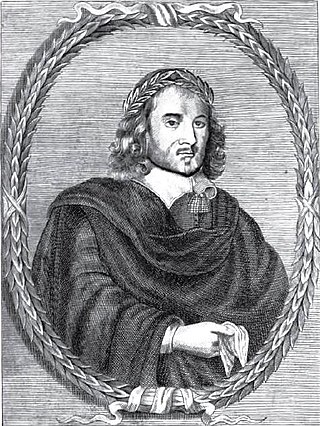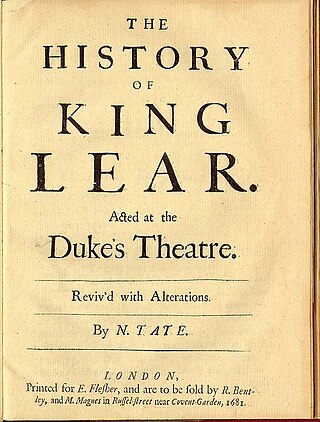This article needs additional citations for verification .(April 2012) |
| |||
|---|---|---|---|
| +... | |||
This article contains information about the literary events and publications of 1681.
This article needs additional citations for verification .(April 2012) |
| |||
|---|---|---|---|
| +... | |||
This article contains information about the literary events and publications of 1681.

William Shakespeare was an English playwright, poet and actor. He is widely regarded as the greatest writer in the English language and the world's pre-eminent dramatist. He is often called England's national poet and the "Bard of Avon". His extant works, including collaborations, consist of some 39 plays, 154 sonnets, three long narrative poems and a few other verses, some of uncertain authorship. His plays have been translated into every major living language and are performed more often than those of any other playwright. Shakespeare remains arguably the most influential writer in the English language, and his works continue to be studied and reinterpreted.

The Tragedy of King Lear, often shortened to King Lear, is a tragedy written by William Shakespeare. It is loosely based on the mythological Leir of Britain. King Lear, in preparation for his old age, divides his power and land between his daughters Goneril and Regan, who pay homage to gain favour, feigning love. The King's third daughter, Cordelia, is offered a third of his kingdom also, but refuses to be insincere in her praise and affection. She instead offers the respect of a daughter and is disowned by Lear who seeks flattery. Regan and Goneril subsequently break promises to host Lear and his entourage, so he opts to become homeless and destitute, and goes insane. The French King married to Cordelia then invades Britain to restore order and Lear's rule. In a subplot, Edmund, the illegitimate son of Gloucester, betrays his brother and father. Tragically, Lear, Cordelia and several other main characters die.

Thomas Middleton was an English Jacobean playwright and poet. He, with John Fletcher and Ben Jonson, was among the most successful and prolific of playwrights at work in the Jacobean period, and among the few to gain equal success in comedy and tragedy. He was also a prolific writer of masques and pageants.
This article contains information about the literary events and publications of 1823.
This article contains information about the literary events and publications of 1707.
This article contains information about the literary events and publications of 1708.
This article contains information about the literary events and publications of 1696.
This article contains information about the literary events and publications of 1687.
This article contains information about the literary events and publications of 1682.
This article contains information about the literary events and publications of 1680.
This article contains information about the literary events and publications of 1679.
This article contains information about the literary events and publications of 1678.
This article contains information about the literary events and publications of 1608.
Nahum Tate was an Anglo-Irish poet, hymnist, and lyricist, who became Poet Laureate in 1692. Tate is best known for The History of King Lear, his 1681 adaptation of Shakespeare's King Lear, and for his libretto for Henry Purcell's opera, Dido and Aeneas. He also wrote the lyrics to a Christmas carol, "While shepherds watched their flocks".

Thomas Betterton, the leading male actor and theatre manager during Restoration England, son of an under-cook to King Charles I, was born in London.

In his own time, William Shakespeare (1564–1616) was rated as merely one among many talented playwrights and poets, but since the late 17th century has been considered the supreme playwright and poet of the English language.
Nationality words link to articles with information on the nation's poetry or literature.
Events from the year 1681 in England.
Events from the 1610s in England.

The History of King Lear is an adaptation by Nahum Tate of William Shakespeare's King Lear. It first appeared in 1681, some seventy-five years after Shakespeare's version, and is believed to have replaced Shakespeare's version on the English stage in whole or in part until 1838. While Tate's version proved extremely popular on the stage and received critical acclaim, the response of literary critics has generally been negative.